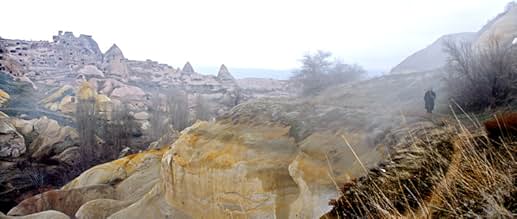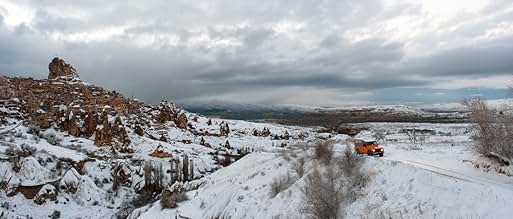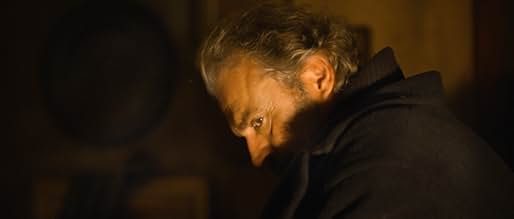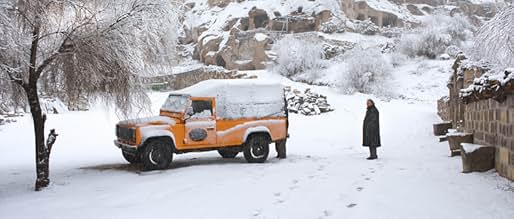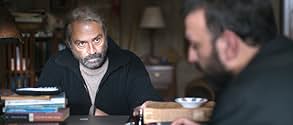VALUTAZIONE IMDb
8,0/10
56.752
LA TUA VALUTAZIONE
Un proprietario d'albergo e padrone di casa in un remoto villaggio turco affronta i conflitti all'interno della sua famiglia e un inquilino in ritardo con l'affitto.Un proprietario d'albergo e padrone di casa in un remoto villaggio turco affronta i conflitti all'interno della sua famiglia e un inquilino in ritardo con l'affitto.Un proprietario d'albergo e padrone di casa in un remoto villaggio turco affronta i conflitti all'interno della sua famiglia e un inquilino in ritardo con l'affitto.
- Premi
- 19 vittorie e 32 candidature totali
Serhat Mustafa Kiliç
- Imam Hamdi
- (as Serhat Kiliç)
Trama
Lo sapevi?
- QuizDirector Nuri Bilge Ceylan revealed that he had more than 200 hours of material and his original cut was 4 hours 30 minutes. He then "worked hard" to make it down to 3 hours 15 minutes.
- BlooperThe books in Aydin's hands change during the argument with his wife.
- ConnessioniReferenced in Estrenos Críticos: Perdida, Sueño de Invierno y One Direction (2014)
- Colonne sonoreSonata in A major D959 - Andantino
Composed by Franz Schubert
Recensione in evidenza
Mr Nuri Bilge Ceylan had made adventurous efforts in his movie "Winter Sleep". Rewardingly, Palme d'Or Awards was passed onto his hands in 2014. A stunning feature of this movie was the eloquence of major characters. Because of this distinct feature, the audiences need feel comfortable to catch up with a large amount of intellectual debates and accusative questionings between the characters, in order to tap into the characters' inner worlds.
During three hours and sixteen minutes, a rich and deep portrait of various emotional sufferings are gradually unfolded. The audiences are exposed to intense conflicts between the rich and the poor, a complacent brother and his critical divorcée sister, an egoistic husband and an unhappy young wife and also a naive philanthropist and a resentful villager. Also, there are explosions and accumulations of negative emotional outbursts such as distrust, prejudice, loneliness, fear, suffocation, delusion, cynicism, hopelessness and hatred.
While viewing these interpersonal tensions and emotional despairs, it seems to me that our characters were all wearing shackles which had stopped them from finding their true inner strength. For Aydin, the shackle was his distrust and emotional rigidity. For Necla, it was her disapproving attitude and reluctance to change. For Nihal, it was her pessimistic view of her future. For Hamdi, it was his deeply-rooted shame and hatred towards the rich. For Hamid's little son Ilysa, it was his inability to fight against social unfairness. For Hamdi's bother Ismail, it was his involuntary submissiveness and unresisting. And perhaps due to these emotional scars, they all felt deprived of freedom and thus pushed each other into corners in order to feel justified.
Mr Nuri Bilge Ceylan opened an abundance of philosophical discussions in this movie. Seemingly he was unwilling to provide effective solution to ease any of these social and interpersonal tensions depicted in the movie. Nevertheless, Mr Ceylan did examine Aydin's self-revelation after he clashed with his sister Necla and his wife Nihal. When Aydin's false ego was badly stricken, the loneliness and pain in Aydin's heart must have been unbearably agonizing. From that moment, the movie started to openly unveil Aydin's vulnerabilities. He contemplated at his parents' graveyard. His messy hair was flying nowhere in the snow, looking terribly sad. When he showed genuine care to the young motorcyclist, that warmth didn't returned back to him. The releasing of a wild horse back to Anatolia steppe could indicate his longing to loosen his own rigidity and forceful mind. While waiting for his run-away train to Istanbul, he frankly demanded the company of his assistance Hidayet. He paid attention to a dead fox lying beside the rails in the snow and even checked birds of prey on the nearby tree. He watched the dying rabbit pitifully during hunting. At the end of the movie, Aydin admitted to himself that he was unable to live through life without Nihal. At this point, when Aydin acknowledged his emotional vulnerabilities, it appeared that he regained his peace and order, and even kicked off his long-term writing project on "the History of Turkish Theatre". Aydin perhaps realized that he no longer needed to be the superior one who was emotionally distant to people and himself, who felt like a king by being a columnist in his imaged kingdom, who loved his own civilized manner to contrast others'clumsiness, who was relying on rigidity to feel strong
Overall, this is a thought-provoking movie, managed by a master director and performed by impeccable cast. I would love to watch this movie again after a few years, as I wish to comprehend more of its richness and depth when life rewards me with more personal experiences.
During three hours and sixteen minutes, a rich and deep portrait of various emotional sufferings are gradually unfolded. The audiences are exposed to intense conflicts between the rich and the poor, a complacent brother and his critical divorcée sister, an egoistic husband and an unhappy young wife and also a naive philanthropist and a resentful villager. Also, there are explosions and accumulations of negative emotional outbursts such as distrust, prejudice, loneliness, fear, suffocation, delusion, cynicism, hopelessness and hatred.
While viewing these interpersonal tensions and emotional despairs, it seems to me that our characters were all wearing shackles which had stopped them from finding their true inner strength. For Aydin, the shackle was his distrust and emotional rigidity. For Necla, it was her disapproving attitude and reluctance to change. For Nihal, it was her pessimistic view of her future. For Hamdi, it was his deeply-rooted shame and hatred towards the rich. For Hamid's little son Ilysa, it was his inability to fight against social unfairness. For Hamdi's bother Ismail, it was his involuntary submissiveness and unresisting. And perhaps due to these emotional scars, they all felt deprived of freedom and thus pushed each other into corners in order to feel justified.
Mr Nuri Bilge Ceylan opened an abundance of philosophical discussions in this movie. Seemingly he was unwilling to provide effective solution to ease any of these social and interpersonal tensions depicted in the movie. Nevertheless, Mr Ceylan did examine Aydin's self-revelation after he clashed with his sister Necla and his wife Nihal. When Aydin's false ego was badly stricken, the loneliness and pain in Aydin's heart must have been unbearably agonizing. From that moment, the movie started to openly unveil Aydin's vulnerabilities. He contemplated at his parents' graveyard. His messy hair was flying nowhere in the snow, looking terribly sad. When he showed genuine care to the young motorcyclist, that warmth didn't returned back to him. The releasing of a wild horse back to Anatolia steppe could indicate his longing to loosen his own rigidity and forceful mind. While waiting for his run-away train to Istanbul, he frankly demanded the company of his assistance Hidayet. He paid attention to a dead fox lying beside the rails in the snow and even checked birds of prey on the nearby tree. He watched the dying rabbit pitifully during hunting. At the end of the movie, Aydin admitted to himself that he was unable to live through life without Nihal. At this point, when Aydin acknowledged his emotional vulnerabilities, it appeared that he regained his peace and order, and even kicked off his long-term writing project on "the History of Turkish Theatre". Aydin perhaps realized that he no longer needed to be the superior one who was emotionally distant to people and himself, who felt like a king by being a columnist in his imaged kingdom, who loved his own civilized manner to contrast others'clumsiness, who was relying on rigidity to feel strong
Overall, this is a thought-provoking movie, managed by a master director and performed by impeccable cast. I would love to watch this movie again after a few years, as I wish to comprehend more of its richness and depth when life rewards me with more personal experiences.
I più visti
Accedi per valutare e creare un elenco di titoli salvati per ottenere consigli personalizzati
- How long is Winter Sleep?Powered by Alexa
Dettagli
- Data di uscita
- Paesi di origine
- Sito ufficiale
- Lingue
- Celebre anche come
- Winter Sleep
- Luoghi delle riprese
- Aziende produttrici
- Vedi altri crediti dell’azienda su IMDbPro
Botteghino
- Lordo in tutto il mondo
- 4.018.705 USD
- Tempo di esecuzione3 ore 16 minuti
- Colore
- Mix di suoni
- Proporzioni
- 2.35 : 1
Contribuisci a questa pagina
Suggerisci una modifica o aggiungi i contenuti mancanti

Divario superiore
What was the official certification given to Il regno d'inverno (2014) in Brazil?
Rispondi

